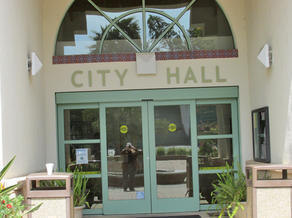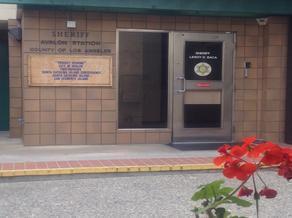Among options are a sales tax increase, changing bed tax, and allowing local sale of recreational adult cannabis
Increasing sales taxes, changes to the Transient Occupancy (short term rental) Tax and allowing the sale of recreational cannabis were among the proposals raised at last week’s City Council’s study session on increasing Avalon’s income.
Although the Thursday, Aug. 22, study session included a discussion of reducing the percentage of the amount of TOT money that the city gives to the Chamber of Commerce (CICVB), the council ultimately directed staff “to have a broader discussion on Transient Occupancy Tax (TOT), not CICVB funding,” according to Assistant City Manager Michael Parmer.
“The TOT discussion is tentatively set on the City Council agenda for the September 3rd meeting,” Parmer wrote in an Aug. 27 email to the Islander.
The CEO of the Catalina Island Chamber of Commerce and Visitors Bureau argued against reducing the money the Chamber receives from the city.
In related news, the Chamber executive committee held an emergency meeting Wednesday, Aug. 28, to address the potential impact if the city reduced the Chamber’s percentage of Avalon’s Transient Occupancy Tax. Members discussed possible responses, but no action was taken. The meeting was basically a gathering of Chamber members trying to brainstorm the best way to approach the issue of a possible TOT funding reduction by the COA at the City Council meeting on September 3rd. Jim Luttjohann asked members to attend the Sept. 3 meeting in support of the CICVB. Those present agreed that it would be beneficial to prepare something that detailed exactly what the Chamber does to promote the Island and what a reduction in funding would mean for businesses and tourism on Catalina Island.
Cannabis
The Avalon Municipal Code currently allows one business to deliver medical marijuana. However, the Island shop has yet to actually open.
Statewide, California voters legalized the sale and use of recreational cannabis in 2016. However, many cities in California have banned either medical or recreational cannabis or both. Meanwhile, the Federal government continues to prohibit banks from handling cannabis-related money.
A hearing on Senate Bill 51, which would legalize cannabis credit unions, is scheduled before the Assembly Appropriations Committee on Friday, Aug. 30.
At the Thursday, Aug. 22, while the council was holding its revenue-generating study session, Mayor Anni Marshall proposed allowing the sale of adult recreational cannabis as a way to raise money for the city.
Marshall said the city allowed the use of adult cannabis,s the city would get a percentage of sales taxes, a percentage of excise taxes, and local taxes. “There’s a possibility to make a lot of moeny for the city,” she said.
The owner of the only medical cannabis shop in town (which hasn’t yet opened for business), outlined some of the differences between medical and recreational marijuana, also known as “adult use,” which was the term he used.
He said that adult use is for sale to adults 21 or older; medical use is for adults 18 or older.
He said he was planning to expand his business to the mainland and that he intended to “piggy back” on his Avalon license. He said if Avalon voters approved a sales tax on adult use cannabis, the sales tax from his mainland sales would come back to the city.
Sales tax
Councilman Oley Olsen brought up the idea of increasing Avalon’s sales tax. He has expressed support for the idea before.
As previously reported, under state law, the city could raise the sales tax by a quarter of a percent.
Mayor Anni Marshall asked what the total dollar amount the city would need.
City Manager Denise Radde said staff could bring a sales tax to the City Council.
“Just to say the city needs money isn’t sexy,” Marshall said.
Later in the meeting, Marshall said she would like to have sales tax increase on the ballot.
The next Avalon election is in March and the deadline for putting measures on the ballot is looming.
Parmer pointed out that medical and recreational marijuana were complex topics.
Transient Occupancy Tax
Staff discussed the Transient Occupancy Tax. Finance Director Baker said that, generally speaking, other cities contribute less to their Chambers of Commerce than Avalon does, but any of those cities have their own marketing arm.
Chamber President and CEO Jim Luttjohann argued that the Catalina Chamber is more of a visitor’s bureau than a Chamber of Commerce.
Luttjohann said in many communities, the Chamber serves as an arm of economic development.
Luttjohann, speaking off the top of his head, said the Chamber had about 249 members. Of them, he guessed perhaps four had their own marking budget.
Concerned that the city might reduce the amount of money it gives the Chamber, Luttjohann said a $100,000 budget cut would be significant.
Luttjohann pointed out that the Chamber’s Visitor Center handles 11,600 phone calls and 10,000 emails and helps promote local events.
City Manager Denise Radde suggested a separate meeting focused on the TOT.
Steve Hoefs said he was not in favor of increasing the TOT or wharfage fees. He said he didn’t want to make it more expensive for visitors to come to the Island.
Hoefs said he would be in favor of a sales tax increase. He said that would be reasonable.
He also expressed a desire to look at off-season events.
Marshall indicated she wanted to decrease the percentage of the TOT that the city gives the Chamber.
Olsen said he would not be in favor of decreasing the Chamber’s percentage.
Marshall said she would like to have a discussion about the TOT.
Neither Olsen nor Hoefs opposed having a discussion.
Council Member Cinde MacGugan-Cassidy was absent for the meeting.
During the meeting, two residents expressed their opposition to bringing more cruise ships to the Island.
Kristy Throndson contributed to this article.










